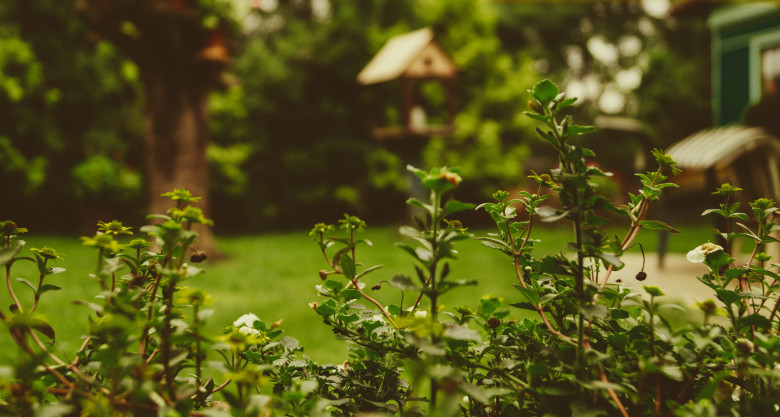Following winter’s storms and spring’s showers, summer is the ideal time to bring your garden back to life. Nature offers an excellent boost to your mental and physical health, so get outside and soak up some of that fantastic Sunshine Vitamin! A great way to get some exercise and get outdoors is sprucing up your home’s outdoor areas. Here are our top five tips for your summertime landscaping projects:
1. Check for Garden Health & Safety
Seasonal storms can wreak havoc on your yards. Before planting or building any new outdoor features, be sure to check the health and safety of your surroundings and do some clean-up. Start with checking trees for dead hanging limbs that need to be cut away. Be sure to also inspect the root system and architecture of your trees. Is the tree leaning excessively to one side? Are any roots a tripping hazard? Trim bushes away from your home and air conditioning condenser. Untrimmed bushes and vines can trap moisture and invite termites and other bugs into your home as well as jeopardize the stability of your exterior walls. Now is a good time to also check that your outdoor lighting is working. Well-planned outdoor lighting improves the curb appeal, safety, and security of your home. Inspect and repair your deck, walkways, and other areas that pose a tripping hazard.
2. Plant Wisely
Creating a sustainable landscape around your home can have many benefits, not only for your own health, but for that of your community. An important part of sustainable landscaping is plant selection. It is estimated that nearly 25 percent of the 20,000 native plant species in North America are at risk of extinction. [1] Using native plants to restore the landscape or as a substitute for exotic ornamental plantings can help to reverse the trend of species loss. Initially native plants may require the same level of care and installation that ornamental plants would; however, once established, native plants take less care and maintenance and are more resistant to drought, freezing, common diseases, and herbivores if planted in their local region. Pollinators are essential for genetic persification and the reproduction of local plants. [2] Native plants help sustain a thriving community of local pollinators, such as bumble bees, butterflies, and hummingbirds, who in turn are instrumental to maintaining a vital ecosystem. It’s the circle of life, folks. Keep it going!
3. Reduce Water Waste
The average American home uses approximately 300 gallons of water per day – 30% of which is used outdoors [3]. A robust garden that includes trees, flowers, and other plants requires a great deal of water to sustain it. During the peak heat season of the year it is imperative to water your garden wisely to optimize water usage and cut down on waste. Experts estimate that 50 percent of the water we use outdoors goes to waste from evaporation, wind, or runoff due to over-watering. [4] Start off by inspecting your current watering systems. Old systems in bad repair are at risk of leaks or over/under-coverage of spray. Install a rain sensor to shut off your sprinkler system when it rains. Water evaporates quickly when the sun is high and hot, so be sure to set your timers for early morning or evening. Adjust the blades on your lawn mower to a height of 2 ½ - 3 inches during the hottest months and only mow once a week. Longer grass will retain moisture better, requiring you to water it less to keep it lush and green.
4. Sustainable Design = Energy + Environmental Efficiency
The benefits of sustainable landscapes include carbon sequestration, cleaning the air and water, increasing energy efficiency, and restoring natural habitats – to name a few. [5] There are many things you can do to make your outdoor space both energy efficient and environmentally friendly. Using native plants and being smart about water usage are just two of those things. Investing in shade – be it planting trees or installing awnings, pergolas, or screens – can significantly reduce solar heat gain – both inside your home and on your patio spaces. In fact, the Department of Energy estimates that an awning can reduce heat gain by up to 77 percent [6]. Parasoleil panels, when used on top of a pergola, can reduce heat gain by 15-degrees Fahrenheit! Composting your home’s waste and using it in your garden is an excellent way to reduce and reuse something you already have at-hand. It will save you money on buying fertilizer at the store and reap benefits throughout your garden. Compost feeds and improves soil, reduces landfill waste, and keeps your environment chemical-free. [7]
5. Relax and Enjoy
Nature nurtures, in so many ways! Despite this, the average American spends 87% of their time indoors and another 6% in closed vehicles. [8] Science has shown that getting outdoors can provide a range of mental, emotional, and physical health perks. These benefits range from improved mental health, increased concentration, and sharper thinking and creativity, to an immune system boost, better vision, and reduced inflammation [9]. Getting outside to work on your garden can elevate your mood and provide your daily recommended amount of exercise in a much more entertaining way than the treadmill at the gym. So, what are you waiting for?
There are many small steps you can take to make the natural environment surrounding your home a rewarding and environmentally-friendly one. Your health, safety, and well-being can all be improved with these tips. If you’re interested in learning more, check out some of the references we cited, get outside, and get to it!
[1]
https://www.nps.gov/plants/restore/pubs/intronatplant/whyusenatives.htm
[2]
https://www.fs.fed.us/wildflowers/pollinators/documents/AttractingPollinatorsV5.pdf
[3] https://www.epa.gov/watersense/how-we-use-water
[4] https://www.epa.gov/watersense/when-its-hot
[5]
http://www.johnroccosales.com/news-blog/2016/4/20/celebrating-our-planet-with-sustainable-landscape
[6]
http://www.washingtonpost.com/wp-dyn/content/article/2008/07/11/AR2008071101595.html
[7]
http://homeguides.sfgate.com/composting-helps-environment-23577.html
[8]
https://snowbrains.com/brain-post-much-time-average-american-spend-outdoors/
[9]
http://www.businessinsider.com/scientific-benefits-of-nature-outdoors-2016-4/#2-restored-mental-energy-2
